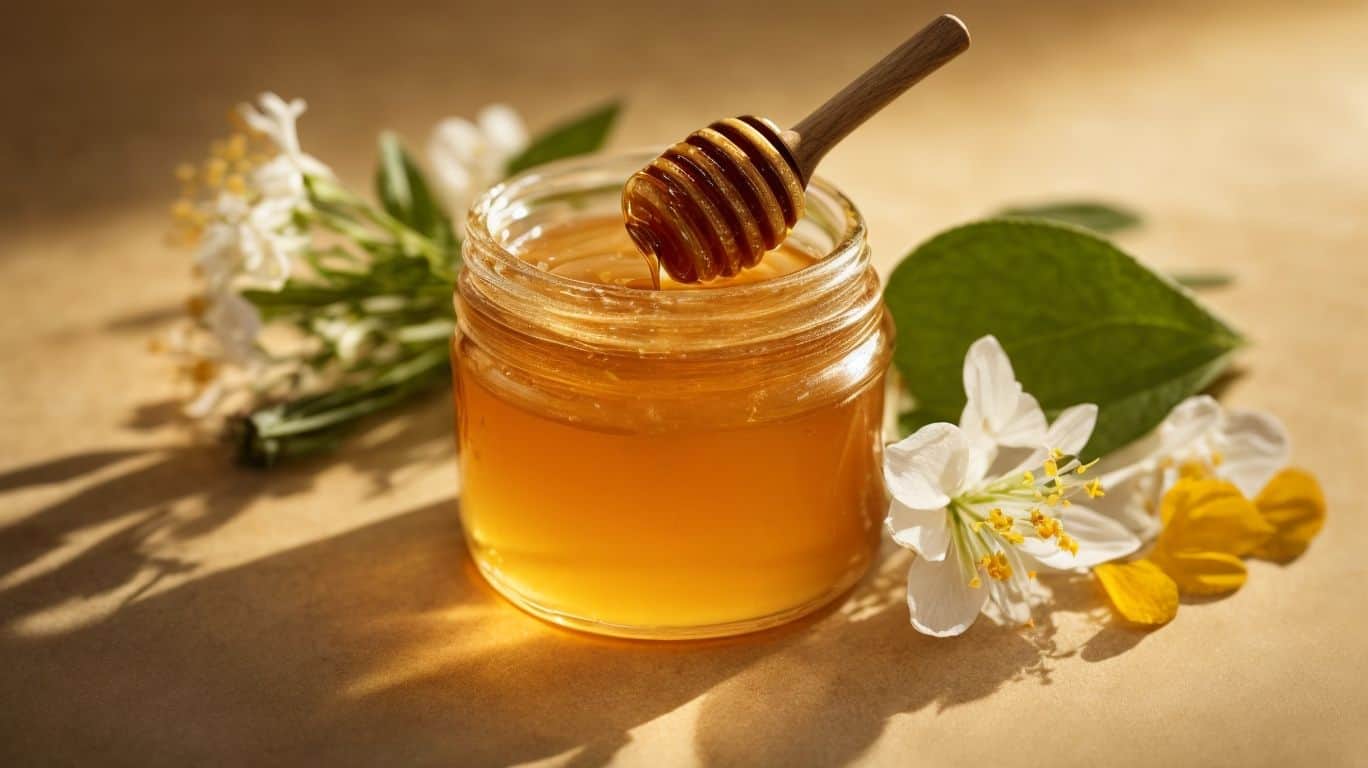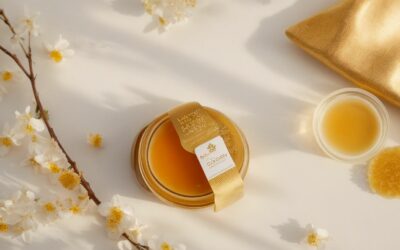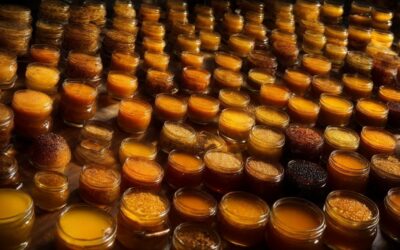You deserve to know the truth about two popular sweeteners: Manuka honey and stevia. With the increasing concern over artificial sweeteners and their potential negative health effects, many people are looking for natural alternatives.
But which one is better? In this article, we will delve into the benefits and drawbacks of Manuka honey and stevia, so you can make an informed decision about which one to use as a sugar substitute.
How Are Manuka Honey and Stevia Different?
Although both manuka honey and stevia are natural sweeteners, they differ in several ways. Let’s take a closer look at how these two sweeteners vary in terms of their source, nutritional content, taste, and uses.
By understanding the unique characteristics of manuka honey and stevia, we can make informed decisions about which one to use in our daily lives. So, let’s dive into the differences between manuka honey and stevia to see which one suits your needs and preferences best.
1. Source
The origin of a product is a crucial aspect to consider when deciding between Manuka honey and Stevia. To aid in your understanding of the source, here are some steps to follow:
- UMF Manuka Honey: This honey is derived from the nectar of the Manuka tree (Leptospermum scoparium) found in New Zealand and Australia. The bees collect the nectar and produce honey with unique properties.
- Stevia: This sweetener is sourced from the leaves of the Stevia rebaudiana plant, which is native to South America. The leaves are dried and processed to extract the sweet compounds known as steviol glycosides.
Gaining knowledge about the source of these products can provide valuable insights into their origins and assist you in making an informed decision.
2. Nutritional Content
The nutritional content of Manuka honey and Stevia differs significantly. Manuka honey is a natural sweetener that contains various vitamins, minerals, and enzymes. It is known for its high levels of antioxidants and antibacterial properties.
On the other hand, Stevia is a zero-calorie sweetener derived from the Stevia plant. It has no carbohydrates, fats, or proteins and is often used as a sugar substitute for those watching their calorie intake.
While Manuka honey offers additional health benefits due to its nutritional content, Stevia is a suitable option for those looking for a low-calorie sweetener alternative.
3. Taste
When it comes to the taste of Manuka honey and Stevia, there are distinct differences to consider.
- Manuka honey has a rich and robust flavor, with hints of caramel and earthiness. Its taste can vary depending on the grade and processing.
- Stevia, on the other hand, has a sweet taste similar to sugar, but with a slight licorice aftertaste.
- Manuka honey’s flavor profile makes it a versatile ingredient in cooking and baking, adding depth to dishes.
- Stevia’s sweetness makes it a popular choice as a sugar substitute in beverages and desserts.
- Ultimately, the choice between Manuka honey and Stevia depends on personal preference and the intended use in recipes or beverages.
4. Uses
- As a natural sweetener in beverages and baked goods
- To enhance the flavor of smoothies and shakes
- As a topping for yogurt, oatmeal, or cereal
- In salad dressings and marinades for a hint of sweetness
- To sweeten homemade jams and jellies
- In sauces and glazes for savory dishes
- As a substitute for sugar in cooking and baking
The uses of Manuka honey and Stevia have evolved over time. Manuka honey has been used for centuries by the indigenous Māori people of New Zealand for its healing properties.
Stevia, on the other hand, has a long history of use as a natural sweetener in South America. Both have found their way into modern cuisine and wellness practices, offering unique flavors and benefits.
Are There Any Risks or Side Effects of Using Manuka Honey or Stevia?
While both Manuka honey and stevia are commonly used as natural sweeteners, it is important to be aware of any potential risks or side effects associated with their consumption.
In this section, we will discuss the potential allergic reactions that may occur with the use of Manuka honey or stevia.
We will also explore how these sweeteners may interact with certain medications and the possibility of contamination in their production. By understanding these potential risks, you can make informed decisions about incorporating these sweeteners into your diet.
1. Allergic Reactions
Allergic reactions to manuka honey or stevia can occur, although they are rare. If you have a known allergy to bees, pollen, or honey, it is advisable to consult a healthcare professional before consuming manuka honey.
Similarly, if you have a known allergy to plants in the Asteraceae/Compositae family, such as daisies or ragweed, it is recommended to use stevia with caution. To reduce the risk of allergic reactions, follow these steps:
- Read product labels carefully to ensure there are no added ingredients or potential allergens.
- Start with small amounts and monitor your body’s response.
- If any adverse reactions occur, such as itching, swelling, or difficulty breathing, discontinue use and seek medical attention immediately.
2. Interactions with Medications
When considering the interactions between medications and substances like manuka honey or stevia, it is important to follow these steps:
- Consult your healthcare provider or pharmacist for advice on potential interactions between your medications and these substances.
- Provide a list of all your medications, including over-the-counter drugs, herbal supplements, and vitamins, to ensure a comprehensive evaluation of any possible interactions.
- Discuss any specific concerns or questions you may have regarding possible interactions with your healthcare provider.
- If advised by your healthcare provider to avoid or limit the use of manuka honey or stevia, make sure to follow their guidance closely.
- Monitor for any adverse effects or changes in your symptoms while using these substances alongside your medications.
Pro-tip: It is always important to prioritize open communication with your healthcare provider to ensure the safe and effective use of medications and dietary supplements.
3. Possible Contamination
Possible contamination is a concern when using manuka honey or stevia. To ensure safety, follow these steps:
- Choose reputable brands: Select products from trusted manufacturers with proper quality control measures.
- Check certifications: Look for certifications like UMF for manuka honey, ensuring it’s authentic and pure.
- Inspect packaging: Ensure that the packaging is intact without any signs of damage or tampering.
- Store properly: Follow storage instructions to prevent contamination from moisture, heat, or light.
- Watch for signs of spoilage: Discard any honey or stevia that has an off smell, unusual color, or mold growth.
Which One Should You Choose: Manuka Honey or Stevia?
When it comes to choosing a natural sweetener, two popular options are manuka honey and stevia. Both have their own unique qualities and uses, making it difficult to decide which one to use.
In this section, we’ll compare manuka honey and stevia in terms of their effectiveness for medicinal purposes and their ability to sweeten foods and drinks. By the end, you’ll have a better understanding of which option is best suited for your needs.
1. For Medicinal Purposes
When deciding between Manuka honey and Stevia for medicinal purposes, there are a few factors to consider:
- Research: It is important to review scientific studies and user experiences to understand the potential benefits of each.
- Consult a healthcare professional: Seeking advice from a doctor or registered dietitian can provide personalized recommendations.
- Allergies and sensitivities: Be aware of any known allergies or sensitivities to honey or Stevia.
- Desired effects: Determine the specific medicinal effects you are seeking, such as antibacterial properties or blood sugar regulation.
- Taste and preferences: Consider your taste preferences and how you plan to incorporate the medicinal ingredient into your routine.
Fact: Both Manuka honey and Stevia have been used for centuries for their potential health benefits.
2. For Sweetening Foods and Drinks
To add sweetness to your foods and beverages, there are several options to consider. Here are some steps to help you choose between Manuka honey and Stevia:
- Manuka Honey: Use this natural sweetener as a healthier alternative to sugar or artificial sweeteners. It adds a unique and delicious flavor to your dishes and drinks.
- Stevia: Opt for Stevia if you are looking for a zero-calorie sweetener. It is a plant-based alternative that can be used in baking, cooking, and beverages.
- Taste: Consider the preferences of yourself and your guests when it comes to taste. Manuka honey has a distinct and rich flavor, while Stevia is known for its sweetness without any aftertaste.
- Usage: Decide based on the specific needs of your recipe. Manuka honey works well in recipes that benefit from its texture and flavor, while Stevia is great for adding sweetness without affecting the texture.
Ultimately, the choice between Manuka honey and Stevia for sweetening foods and drinks will depend on personal preference, dietary goals, and the specific requirements of your recipe.
Frequently Asked Questions
What is the difference between Manuka Honey and Stevia?
Manuka Honey and Stevia are two different types of sweeteners. Manuka Honey is a natural sweetener made from the nectar of the Manuka plant, while Stevia is a sugar substitute derived from the leaves of the Stevia rebaudiana plant.
Which is healthier, Manuka Honey or Stevia?
Both Manuka Honey and Stevia have health benefits, but Manuka Honey is generally considered to be the healthier option. It contains antioxidants and has antibacterial properties, while Stevia has zero calories and may help with blood sugar control.
Can Manuka Honey and Stevia be used interchangeably?
No, Manuka Honey and Stevia cannot be used interchangeably. They have different levels of sweetness and different flavor profiles, so they may not work the same way in recipes or drinks.
Can Manuka Honey and Stevia be combined?
Yes, Manuka Honey and Stevia can be combined to create a sweetener with a unique taste and added health benefits. However, it’s important to note that the combination may have a stronger flavor than using just one of the sweeteners alone.
Is Manuka Honey or Stevia better for weight loss?
Stevia is often recommended for weight loss due to its zero calorie content, but Manuka Honey can also be incorporated into a healthy weight loss diet. It provides a natural source of energy and has a low glycemic index, which can help with blood sugar regulation.
Are there any potential side effects of consuming Manuka Honey or Stevia?
While both Manuka Honey and Stevia are generally considered safe for consumption, it’s important to consume them in moderation. Manuka Honey is high in sugar and can potentially cause weight gain, while Stevia can have a bitter aftertaste in large quantities. It’s always best to consult with a healthcare professional before incorporating any new sweetener into your diet.
I’m a Manuka honey enthusiast and creator of Manuka Honey Organic, a blog where I share my journey with authentic Manuka honey from New Zealand. I want everyone to learn about the healing powers of Manuka honey.





